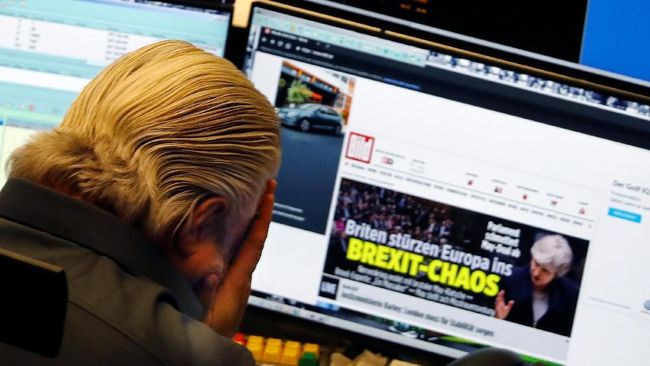Jakarta, CNBC Indonesia – A number of stock exchanges in the world collapsed on Friday (6/5/2022), stung by the sentiment of a massive sell-off on the United States (US) stock exchange, aka Wall Street.
The Indonesian stock exchange itself is still celebrating the 2022 Eid holiday until today. If the market opens, the sentiment of ‘burning out’ of global stock markets has the potential to put great pressure on the Jakarta Composite Index (JCI) today.
The good news is, since the beginning of the year (ytd), the JCI itself has appeared to be a tokcer by rising 9.84% and several times breaking the highest level, supported by foreign funds inflows (net buys) of IDR 72.12 trillion in all markets.
From the Asian region, as of 10.30 WIB, the majority slipped into the red zone. Only the Nikkei 225 index Tokyo (Japan) managed to rebound to 0.12%, after at 09.26 WIB it was still down 0.06%.
Hong Kong’s Hang Seng Index was the ‘loser’ with a fall of 3.77%.
Technology stocks in the Asian continent experienced significant selling pressure, following the ‘fire’ that occurred in the US Nasdaq Composite index which fell almost 5%. The Nasdaq itself is full of technology stocks.
Shares of tech conglomerate Tencent on the Hong Kong stock exchange, for example, fell 3.33%. Meanwhile, Chinese e-commerce giant Alibaba’s shares fell 5.27% and Meituan fell 3.46%.
The technology index on the Hang Seng itself fell 3.8%.
In Japan, the shares of the giant conglomerate SoftBank Group depreciated 2.46%. Internet company Kakao from South Korea fell 4.27% and electronics giant Samsung Electronics fell 1.91%.
Stock Index Performance in Several Countries
|
Stock Index |
Daily % (6/5) |
|
Hang Seng Index (Hong Kong) |
-3.77 |
|
Indeks Sanghai Composite (Shanghai) |
-2.11 |
|
KOSPI (South Korea) |
-1.38 |
|
Index Straits Times (Singapura) |
-1.3 |
|
Vietnam Index |
-1.08 |
|
Indeks Nikkei 225 (Tokyo) |
0.12 |
|
DAX (Germany)* |
-0.49 |
|
CAC40 (France)* |
-0.43 |
|
UK FTSE 100* |
0.13 |
|
Dow Jones (AS)* |
-3.12 |
|
S&P 500 (AS)* |
-3.56 |
|
Nasdaq (AS)* |
-4.99 |
|
Ibovespa (Brazil)* |
-2.81 |
Source: RTI, Refinitiv, Investing | *As of Thursday (5/5/2022)
On Thursday (5/5), Germany’s DAX and France’s CAC 40 also closed down 0.49% and 0.43%. Meanwhile, the FTSE Index closed up 0.13%.
Investors in the European region were watching data from the Bank of England (BOE), which raised interest rates to the highest level in 13 years in a bid to tackle soaring inflation.
Meanwhile, from the United States of America, The Dow Jones index weakened 1,063 points or fell 3.12% to 32,997.97 levels.
The Nasdaq slumped 4.99%, ending at 12,317.69 and its lowest closing level since November 2020. Both losses were their worst daily losses since 2020.
Further, the S&P 500 index fell 3.56% to 4,146.87, marking its second worst day so far this year.
The move came after a big rally in the stock market on Wednesday (4/5), where the Dow Jones index jumped 932 points or 2.81% and the S&P 500 index jumped 2.99% and became the biggest gain since 2020. The same thing happened in The Nasdaq rose 3.19%.
“If you’re up 3% and then you give up half a percent the next day, that’s pretty normal. But to have a day like we had yesterday and then see it 100% reverse in half a day is absolutely incredible,” said the Managing Director. Schwab Center for Financial Research Randy Frederick trading quoted from CNBC International.
Big tech issuers came under pressure, with Meta and Amazon dropping 6.8% and 7.6%, respectively. Not only that, Microsoft shares fell 4.4%, Salesforce shares fell 7.1%, and Apple shares fell almost 5.6%.
E-commerce stocks were the main source of decline on Thursday (5/5) due to several disappointing financial performance releases.
Shares of Etsy and eBay plunged 16.8% and 11.7%, respectively, after releasing balance sheet guidance indicating a fall from market expectations. On top of that, Shopify shares slumped nearly 15%.
The decline lifted the Nasdaq index towards its worst day in two years.
In addition, Wall Street’s blush came after the US Federal Reserve (The Fed) raised its benchmark interest rate by half a percentage point, in line with market expectations and also the biggest increase in two decades.
“Without a clear news stream to explain the sharp reversal, it appears that Powell’s easing — indicating a 75bp (basis point) rate hike may be a step too far — is also giving way to a renewed focus on high inflation and a challenging growth outlook,” Taylor Nugent, an economist at National Australia Bank, was quoted by CNBC International.
CNBC INDONESIA RESEARCH TEAM
(adf/adf)
–


